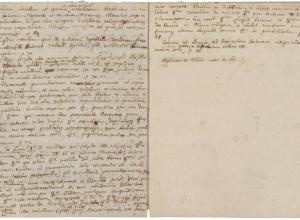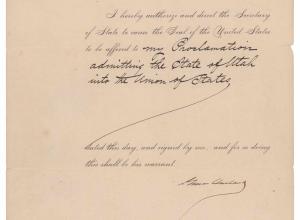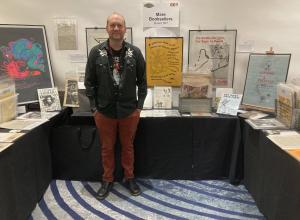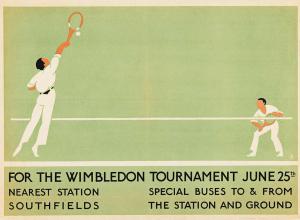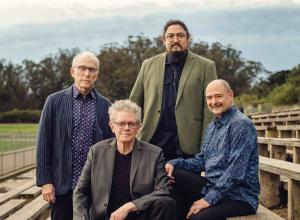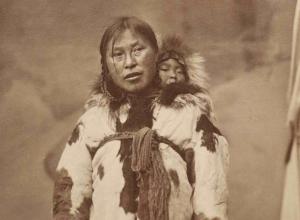Library Acquires Archives of Iconic Talk Show Host Dick Cavett
With a career spanning more than 50 years, legendary TV personality Dick Cavett is recognized as one of the most cultured and savvy talk-show hosts in the history of television. The Library of Congress announced today that Cavett has donated 2,500 programs of his decades-long talk-show series—showcasing some of the golden moments in television—to the American people.
The collection totals nearly 2,000 hours of programming—about 78 days worth of viewing—and features more than 5,000 guests. The list of guests, many whom rarely appeared on late-night television, is a testament to Cavett’s appeal as a knowledgeable and thoughtful interviewer. They include Muhammad Ali, Louis Armstrong, Fred Astaire, James Baldwin, Marlon Brando, Ingrid Bergman, Mel Brooks, Truman Capote, Noel Coward, Duke Ellington, Helen Hayes, Jim Henson, Katharine Hepburn, Alfred Hitchcock, John Kerry, Myrna Loy, Norman Mailer, Mickey Mantle, Groucho Marx, Arthur Miller, Toni Morrison, Paul Newman, Laurence Olivier, Anthony Perkins, Ronald Reagan, Jackie Robinson, Mort Sahl, Charles Schulz, Steven Spielberg, Gloria Swanson, Gore Vidal, Orson Welles, Tennessee Williams, Joanne Woodward and many more.
Many rock-and-roll musicians were also featured guests on his shows, including David Bowie, Judy Collins, David Crosby, Jimi Hendrix, Mick Jagger, Janis Joplin, John Lennon and Yoko Ono, Stephen Stills and Joni Mitchell.
“Dick Cavett turned interviewing into an art form,” said Librarian of Congress Carla Hayden. “He could talk to anyone, and his ability to listen and make the fascinating people who sat across from him more relatable guaranteed his place in television history.”
“I still have to convince myself that I actually interviewed and knew all of those incredible people,” said Cavett. “Looking at the archive of my shows now is simply overwhelming for me. I’m thrilled that the Library of Congress will be the permanent repository for the collection. When I see one of the old shows now, my first thought is ‘What is that starstruck kid from Nebraska doing with whoever the genius of the moment happened to be.’”
Cavett’s archive represents a significant addition to the Library’s impressive collections of film and television icons, including Jerry Lewis, Bob Hope, Groucho Marx, Ernie Kovacs and Edie Adams, Danny Kaye, Johnny Carson and Lucille Ball and Desi Arnaz. The Dick Cavett Collection will be available to qualified researchers in the Library’s Motion Picture and Television Reading Room in Washington, D.C.
Many of Cavett’s interviews with the famous and sometimes infamous were often filled with humor, startling revelations and high drama, including on-air altercations. Collection highlights include:
- A controversial confrontation between writers Gore Vidal and Norman Mailer about Mailer’s misogynistic tendencies and Vidal comparing him to Charles Manson;
- The widow of Lee Harvey Oswald talks about her actions immediately after watching John F. Kennedy’s assassination on television;
- A humorous conversation with Louis Armstrong reflecting on being in Chicago in the days of Al Capone;
- James Baldwin in a 1968 interview candidly talks about the negative perception of black activism and his view that integration is a euphemism for white superiority;
- Mickey Mantle shares a startling personal secret about his teen years;
- In a 1971 interview, John Lennon and Yoko Ono talk about their relationship and the Beatles;
- Arthur Miller describes being blacklisted because of his protests against McCarthyism and the writing of “The Crucible”;
- Lauren Bacall reveals her best-kept secret as a young star in Hollywood—her Jewish heritage;
- The interview with Judy Collins, whose censored comments caused a firestorm;
- Surrealist artist Salvador Dalí’s unorthodox appearance in 1970 with Lillian Gish and Satchel Paige.
A winner of three Emmy Awards, Cavett has been nominated for the award 11 times. During his 35 years as a talk-show host, he has appeared on five different networks. He was the host of the “Dick Cavett Show” on ABC from 1968 to 1975 and on public television from 1977 to 1982. He also successfully hosted shows on CBS, USA and CNBC. Cavett also hosted a series of programs on HBO and his compelling interviews were the inspiration for the PBS documentaries “Dick Cavett’s Watergate” (2014) and “Dick Cavett’s Vietnam” (2015).
Cavett is an accomplished actor and writer. He appeared in a dozen feature films including “Beetlejuice” and “Forrest Gump.” He wrote for Jack Paar’s and Johnny Carson’s late-night talk shows and authored four books, including the most recent “Talk Show: Confrontations, Pointed Commentary, and Off-Screen Secrets” (2010) and “Brief Encounters: Conversations, Magic Moments, and Assorted Hijinks” (2014). He has written an online opinion column for the New York Times since 2007 and for numerous other publications, including the New Yorker, TV Guide and Vanity Fair.
The Library of Congress Packard Campus for Audio Visual Conservation is a state-of-the-art facility funded as a gift to the nation by the Packard Humanities Institute. The Packard Campus is the site where the nation’s library acquires, preserves and provides access to the world’s largest and most comprehensive collection of motion pictures, television programs, radio broadcasts and sound recordings. The Packard Campus is home to more than 7 million collection items. It provides staff support for the Library of Congress National Film Preservation Board, the National Recording Preservation Board and the national registries for film and recorded sound.
The Library of Congress is the world’s largest library, offering access to the creative record of the United States—and extensive materials from around the world—both on-site and online. It is the main research arm of the U.S. Congress and the home of the U.S. Copyright Office. Explore collections, reference services and other programs and plan a visit at loc.gov; access the official site for U.S. federal legislative information at congress.gov; and register creative works of authorship at copyright.gov.






